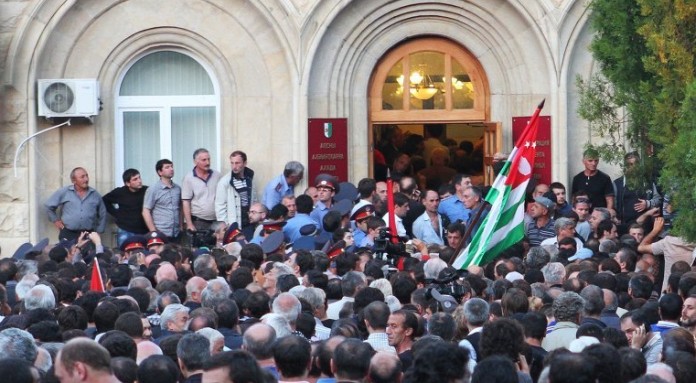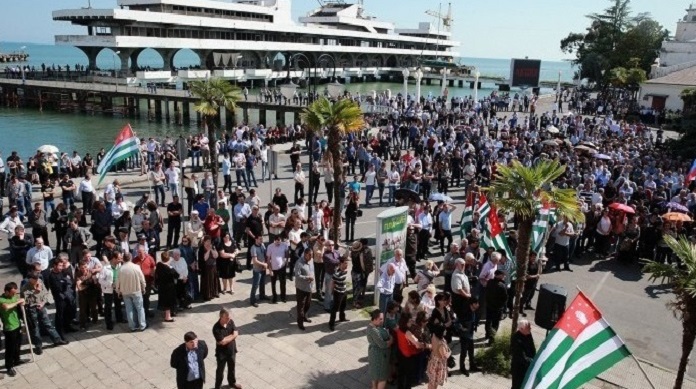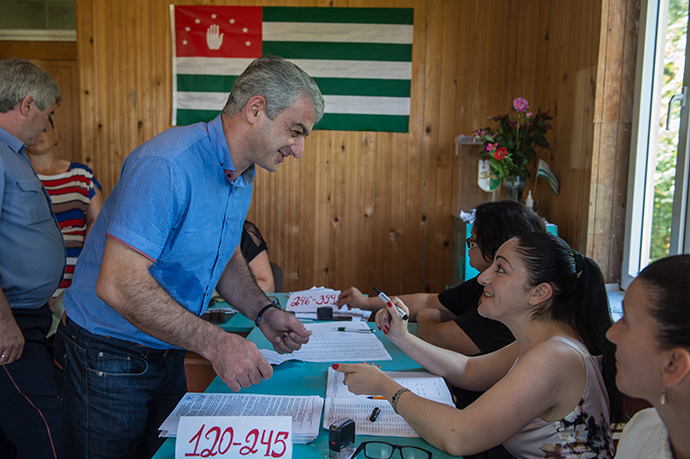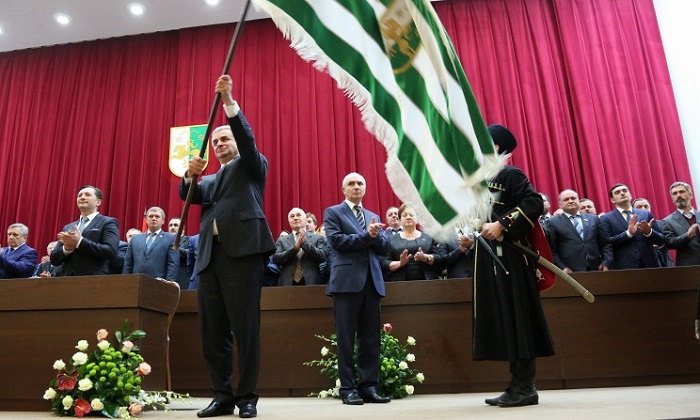Abkhazia in 2014: Back to the Future? By Liz Fuller

Opposition supporters storm the office of Abkhazian President Alexander Ankvab in Sukhum (27 May 2014)
Liz Fuller | Special to Abkhaz World
It would hardly be an exaggeration to say that 2014 was one of the most eventful, even fateful years for Abkhazia since 1993. It can in fact be compared only with 2008, the year when Russia finally formally recognized Abkhazia as an independent sovereign state.
The similarities, moreover, highlight a pattern that has disturbing implications both for Abkhazia’s domestic politics and for its evolving and complex relations with its northern neighbour. Russia’s recognition of Abkhaz independence in 2008 was less an acknowledgement of the merits of Abkhaz arguments that it qualified for such status as dictated by geo-political considerations, namely the desire to compound the humiliation already inflicted by the Russian military on Georgia, and its president, Mikheil Saakashvili in the August war and to undermine Georgia’s chances of NATO membership.
By the same token, the Kremlin took masterful advantage of the political crisis triggered in late May by the opposition Coordinating Council’s bid to oust President Aleksandr Ankvab. The Russian leadership not only succeeded in bringing Raul Khadjimba to power, a decade after its initial failed effort to do so, but went on to impose on him the signing of the landmark treaty on union relations and strategic partnership that many fear condemns Abkhazia to the role of Moscow’s geo-political pawn.
On a purely domestic level, the bloodless putsch that resulted in Ankvab’s forced resignation was the logical culmination of the campaign launched in early 2013 by the opposition parties headed by Khadjimba’s Forum of National Unity of Abkhazia that aligned several months later in the Coordinating Council. Having failed in March 2013 to force the resignation of Prime Minister Leonid Lakerbaia, the opposition presented Ankvab in April 2014 with a new set of demands, including the creation of a government of national unity, to be headed by a prime minister nominated by the opposition; constitutional changes that would transfer to the prime minister many of the powers currently vested in the president; and the dismissal of the prosecutor-general and the heads of the Gal, Ochamchira, and Tkuarchal districts.

Supporters of Abkhazian President Aleksandr Ankvab at the rally on Sergei Bagapsh Square in Sukhum. (28 May 2014)
When Ankvab rejected those demands as an unacceptable ultimatum and sought to play for time, the Coordinating Council convened a popular assembly in Sukhum on May 27 at which speakers enumerated the catastrophic consequences of Ankvab’s high-handed and secretive leadership style and deplored the government’s apparent lack of a clear-cut programme of economic development.
Coordinating Council emissaries then embarked on late-night negotiations with Ankvab, which were disrupted when Khadjimba supporters, some of them reportedly armed, forced their way into the presidential palace. Ankvab fled the building and took refuge at the Russian military base at Gudauta. The Kremlin dispatched to Sukhum its pointman Vladislav Surkov, who had managed Khadjimba’s presidential election campaign in 2004. Late on May 29, parliament passed a vote of no confidence in Lakerbaia’s government and called on Ankvab to resign, which he eventually did on June 1, one day after the legislature had declared its speaker Valery Bganba acting president in his place.
The parliament then scheduled a pre-term presidential ballot for August 24. Khadjimba initially said he did not plan to run, but subsequently registered as a candidate. So too did former Defence Minister Mirab Kishmaria, former Interior Minister Leonid Dzapshba, and State Security Service head Aslan Bzhania, who had the support of Ankvab and the outgoing government. It is a measure of the Abkhaz electorate’s ambivalent attitude towards Khadjimba that he avoided a second round run-off against Bzhania by just 559 ballots, polling 50.57 percent of the 99,869 votes cast. Some 22,000 Georgians were stripped of the right to vote on the grounds that the process by which they had acquired Abkhaz passports was illegal.

People vote at a polling station in the village of Tamysh during the Abkhazian presidential election. (24 August 2014)
Following his inauguration with much pomp and circumstance on September 25, Khadjimba named to head the new government businessman Beslan Butba, whose Economic Development Party of Abkhazia had been part of the united opposition since early 2013. Butba was slightly injured in what he described as a standoff in mid-November with several men who were drunk; initial reports dubbed the incident an attempt on his life.
Khadjimba has not, however, delivered on other pre-election promises, such as amending the constitution to create “a genuine mechanism of checks and balances” between the legislature and the executive branches, although during an address in November he reaffirmed the need to do so.
Furthermore, he has not met the deadline for implementing at least three provisions of the Social-Political Agreement he signed together with the other presidential candidates in August. They are drafting and adopting legal amendments that would guarantee the complete independence of the Control Chamber from the government; introducing the treasury system of budget execution; and imposing a moratorium on the extraction of minerals pending the adoption of an Ecological Doctrine.
In his inauguration speech, Khadjimba stressed the need to sign a new treaty with the Russian Federation “directed at deepening integration, in the first instance, in the sphere of defence, of border protection, and of broadening our economic possibilities.”
The initial version of the treaty, drafted in Moscow and provisionally entitled “On Union Relations and Integration,” was unveiled in mid-October. It immediately triggered outraged protest in Sukhum, where politicians across the political spectrum saw it as a threat to Abkhaz independence. Even Khadjimba went on record as admitting in a televised address to the nation that he disagreed with some articles of the draft.
The Abkhaz side duly sent back to Moscow a revised draft in which the term “integration” was replaced by the more anodyne “strategic partnership,” and provisions that would have effectively subordinated the Abkhaz armed forces and police to Russian oversight were revised. That revised version, with minor changes, was signed at a meeting between Khadjimba and Russian President Vladimir Putin in Sochi on November 24. Putin announced later the same day that Russia will make available to Abkhazia in 2015 5 billion rubles ($111.5 million) to cover the cost of implementation of the treaty’s provisions, in addition to the 4 billion rubles already envisaged under a new investment program for 2015-2017. Whether the Butba government will use that money more effectively than its predecessor to revive Abkhazia’s stagnating and moribund economy remains to be seen.

Newly elected President Raul Khadzhimba, left, takes office in an inauguration ceremony. (25 September 2014)
The events of the past year have served to highlight once again the extent to which Abkhaz politics has been dominated for the past two decades by individuals and their personal ambitions, rather than by political parties with an agenda calculated to appeal to a specific segment of the population. That may change, however. Former Foreign Minister and Prime Minister Sergei Shamba, who was elected to parliament in a December by-election, has stressed the need to strengthen the party system. Meanwhile Amtsakhara , Ankvab’s former support base and the most vocal critic of the new treaty with Russia, has repeatedly criticized the new leadership for its failure to deliver on its promises and for denying the opposition access to the state-controlled media.
Political questions are likely to be eclipsed in 2015 by economic issues, especially since the parliament, responding to a request from Khadjimba, postponed until April 2016 the local elections due in February 2015. Similarly crucial is the question of Abkhazia’s relations with Russia, and not just in terms of implementing the provisions of the new treaty. In the six weeks since the treaty was signed, the meltdown of the ruble vis-à-vis the US dollar and the euro and plummeting oil prices have compounded speculation about the impact of possible economic collapse on Russia as a whole and President Putin personally. In that worst-case scenario, Moscow might find itself unable to deliver on its promises of generous financial aid to Abkhazia ranging from raising pensions and public sector wages to the level paid in the Southern Federal District to re-equipping the Abkhaz military.
By the same token, any sign that President Putin is losing control is likely to trigger fear in Abkhazia that Georgia might seek to take advantage of turmoil in Russia to launch a new war to bring Abkhazia and South Ossetia back under its control.
Liz Fuller writes the Caucasus Report blog for Radio Free Europe/Radio Liberty.